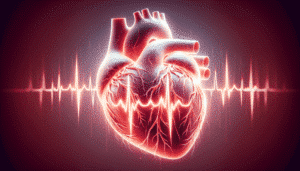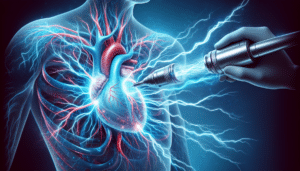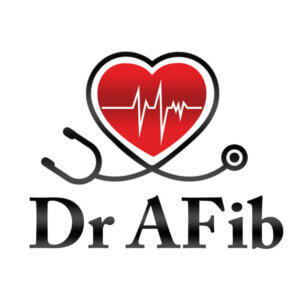Are anxiety heart palpitations causing you distress? Understanding the link between stress and your heartbeat is the first step towards relief. Our guide discusses this connection and offers effective strategies to help you ease these symptoms and regain control.
Key Takeaways
- Anxiety can trigger heart palpitations as part of the fight or flight response by activating the sympathetic nervous system, and these palpitations are generally harmless but can be distressing.
- Managing anxiety-induced heart palpitations can involve sleep regulation, deep breathing techniques, regular exercise, mindfulness, and identifying and avoiding triggers such as caffeine and stress.
- Professional help should be sought if heart palpitations are frequent, last over 30 seconds, or are accompanied by symptoms like chest pain or shortness of breath, and may include therapy, medication, and lifestyle changes.
Understanding Anxiety-Induced Heart Palpitations
Anxiety, a common emotional state characterized by feelings of worry and fear, can cause physical sensations that are anything but ordinary. One such manifestation is heart palpitations – an irregular or rapid heartbeat that can feel like your heart is pounding, racing, or missing beats. Anxiety can cause heart palpitations, as they are often the body’s response to stress, with anxiety acting as a trigger for panic attacks as well.
The heart’s rhythm is regulated by the autonomic nervous system, which is activated by stress and anxiety. This system consists of two branches: the sympathetic and parasympathetic. When you’re anxious, the sympathetic branch kicks in, increasing your heart rate as part of the fight or flight response. This can lead to heart palpitations, which, while usually harmless, can be distressing. But rest assured, anxiety is the most common cause of palpitations not related to heart problems.
Fight or Flight Response
The fight or flight response is your body’s natural reaction to perceived threats. It’s a survival mechanism that prepares you to either confront or escape danger. When this response is activated, it can cause the following physiological changes:
- Release of adrenaline
- Escalation of heart rate
- Increased strength of heart contractions
- Potential palpitations
The role of the body’s autonomic nervous system is divided between its two branches: the sympathetic and parasympathetic nervous systems. The sympathetic nervous system is responsible for increasing heart rate and blood pressure during stress, while the parasympathetic nervous system calms the body down after the stressor is removed, reducing heart rate and blood pressure. This delicate balance ensures your body responds appropriately to stressful situations, but when anxiety triggers this response, it can lead to an increased heart rate and palpitations.
Physical Symptoms of Anxiety
Anxiety doesn’t just affect your mind; it can also manifest in physical symptoms. Some common physical symptoms of anxiety include:
- Heart palpitations
- Chest pain
- Shortness of breath
- Dizziness
- Nausea
- Headaches
- Muscle tension
- Sweating
It’s important to note that these symptoms can also be caused by other medical conditions, so it’s always a good idea to consult with a healthcare professional to determine the cause.
Rapid breathing is another physical symptom commonly experienced during anxiety episodes. This quick, shallow breathing can heighten feelings of fear and anxiety, creating a vicious cycle that can be hard to break. Recognizing these symptoms is the first step to managing anxiety and reducing the incidence of heart palpitations.
Managing Anxiety-Related Palpitations
Managing anxiety-related heart palpitations involves a multi-pronged approach that addresses both the physical symptoms and the underlying anxiety. One crucial aspect of this is improving sleep quality. Inadequate sleep can exacerbate anxiety and increase the likelihood of experiencing heart palpitations. By establishing a regular sleep pattern, you can aid in regulating stress and mood, which may reduce the frequency of anxiety-related palpitations.
Furthermore, simple practices such as deep breathing can maintain a steady heart rate and alleviate palpitations stemming from anxiety. Participating in stress reduction activities can also prove beneficial in managing palpitations, especially when they are caused by stress rather than heart disease.
Deep Breathing Techniques
Deep breathing techniques can be a powerful tool in your anxiety management toolkit. Techniques like the 4-7-8 method and diaphragmatic breathing can help activate the parasympathetic nervous system, promoting a state of calmness. By physically relaxing the body, these exercises signal the brain to reduce the production of stress hormones, helping to alleviate anxiety and steady the heart rate.
Box breathing, a technique involving breathing in, holding, and exhaling each for a count of four, is a systematic method to manage stress and lower heart rate. By collectively employing these deep breathing exercises, you can shift your body into a less stressed state, calming anxiety and steadying the heart rate.
Regular Exercise and Mindful Movement

Regular physical activity is not just good for your body; it’s also beneficial for your mind. Regular exercise can:
- Relieve symptoms of depression
- Increase energy, potentially alleviating anxiety-related heart palpitations
- Support heart health
- Release endorphins, which help cope with stress and may prevent heart palpitations.
Mindful movement practices like yoga, tai chi, and qi gong, which combine physical postures, mental focus, and controlled breathing, can improve heart health and manage stress. By incorporating regular exercise and mindful movement practices into your daily life, you can soothe anxiety-induced heart palpitations.
Stress Reduction Activities
Stress reduction activities can play a significant role in managing anxiety-induced heart palpitations. Relaxation techniques, including specific breathing exercises, can provide quick calming effects for infrequent, non-condition related heart palpitations.
Mindfulness and meditation practices encourage focusing on the present, which can help minimize stress and anxiety, preempting heart palpitations. Additionally, pursuing enjoyable activities or hobbies can serve as a natural stress relief, aiding in the management of anxiety and the prevention of heart palpitations.
Regular moderate cardiovascular exercises, such as brisk walking or swimming, can strengthen the heart and reduce or prevent the occurrence of heart palpitations.
Identifying Triggers and Prevention
Identifying triggers is a critical step in managing anxiety-related heart palpitations. Factors such as:
- stress
- certain medications
- stimulants like caffeine
- medical conditions including electrolyte imbalances and thyroid disorders
can trigger heart palpitations. By keeping a journal to track activities, diet, and emotional states, you can assist in identifying the specific triggers of your anxiety-induced heart palpitations.
Practices that contribute to heart health and can reduce palpitations include:
- Engaging in vagal maneuvers
- Maintaining a balanced diet rich in nutrients, fruits, and vegetables to maintain good electrolyte levels
- Staying well hydrated
- Avoiding stimulants
Identifying triggers and implementing preventive measures can go a long way in managing anxiety-induced heart palpitations.
Monitoring Caffeine Intake

We all love a good cup of coffee or tea, but for some, these beverages can trigger heart palpitations. Stimulants such as caffeine can lead to palpitations in some individuals. Reducing the intake of caffeine may help lower the risk of experiencing heart palpitations.
Given that individual sensitivity to caffeine varies, personal monitoring of intake becomes crucial for those who experience symptoms such as palpitations.
Getting Enough Sleep
Sleep is an essential component of overall health, and its importance cannot be overstated when it comes to managing anxiety-related heart palpitations. Chronic sleep deprivation is associated with a heightened risk of anxiety disorders, whereas enhanced sleep quality can contribute to the alleviation of anxiety symptoms.
Insufficient sleep can exacerbate anxiety, while anxiety can complicate sleep efforts, creating a cyclical problem that may require professional intervention if sleep difficulties are not resolved.
Seeking Professional Help
While self-management strategies can be effective, it’s essential to consult a healthcare provider if you’re experiencing frequent heart palpitations or severe anxiety symptoms. A healthcare provider can diagnose the causes of heart palpitations and severe anxiety to recommend suitable treatments.
For anxiety management, therapists or licensed counselors can provide crucial support and techniques for addressing anxiety sources.
Treatment Options for Anxiety Disorders
If experiencing anxiety-related heart palpitations, know that help is available. Treatment options for anxiety disorders range from therapy and medication to non-drug techniques like relaxation exercises and meditation. Therapies such as cognitive-behavioral therapy can effectively treat anxiety disorders, focusing on changing negative thought patterns and behaviors.
Medications, including selective serotonin reuptake inhibitors (SSRIs), are commonly prescribed for anxiety disorders. However, it’s crucial to consider their benefits, side effects, and personal responsiveness to such treatments. Regular non-drug techniques such as relaxation exercises, biofeedback, and meditation can help keep anxiety and related symptoms under control.
If heart palpitations continue despite nonmedical management, it’s crucial to talk to a healthcare provider about possible medical treatments for anxiety.
Medications for Anxiety

Medications can play a crucial role in managing anxiety disorders. Selective serotonin reuptake inhibitors (SSRIs) are commonly used as a first-line treatment for generalized anxiety disorder. Serotonin-norepinephrine reuptake inhibitors (SNRIs) serve a similar function, although they have different efficacy for certain conditions like OCD.
Benzodiazepines can provide quick relief of acute anxiety symptoms but are not typically used long-term due to risks of dependency and withdrawal. Other options include tricyclic antidepressants (TCAs), which may be prescribed if SSRIs are not effective, but they come with more adverse side effects.
Buspirone, a medication that can treat both short and long-term anxiety symptoms, carries a lower risk of dependency compared to benzodiazepines.
Psychotherapy
Psychotherapy is a powerful tool in treating anxiety disorders. Some reputable and widely studied forms of psychotherapy for treating anxiety disorders include:
- Cognitive behavioral therapy (CBT), which focuses on the modification of negative thoughts and behaviors
- Exposure-response prevention, a subset of CBT, which encourages patients to face their anxiety triggers and build positive coping responses
- Interpersonal therapy (IPT)
- Dialectical behavior therapy (DBT)
- Psychodynamic psychotherapy
- Acceptance and commitment therapy (ACT)
These various therapeutic techniques offer different pathways to address and alleviate anxiety symptoms.
Psychotherapy for anxiety is often personalized, involving a combination of cognitive therapy, relaxation techniques, and sometimes medication, tailored to the individual’s unique needs and situations.
When to Seek Medical Attention
While anxiety-related heart palpitations are usually not a cause for concern, there are situations when medical attention is necessary. If heart palpitations are accompanied by:
- chest discomfort or pain
- fainting
- severe shortness of breath
- severe dizziness
Immediate medical attention is required.
Moreover, if nonmedical therapies fail to relieve ongoing heart palpitations accompanying anxiety symptoms, it’s important to talk to a healthcare provider for an evaluation.
Recognizing Serious Symptoms
While heart palpitations can be a normal response to stress or anxiety, certain heart palpitations symptoms should not be ignored. Palpitations accompanied by symptoms such as:
- shortness of breath
- chest pain
- fainting
- dizziness
May be indicative of a serious condition, such as high blood pressure or cardiac arrhythmia, and should be evaluated by a healthcare provider.
Individuals with a history of heart disease should seek evaluation for frequent palpitations or palpitations that worsen over time, as they may be experiencing atrial fibrillation or another type of abnormal heart rhythm. To determine if palpitations signify a serious heart condition, heart-monitoring tests may be necessary, such as:
- Electrocardiogram (ECG)
- Holter monitoring
- Event recording
- Echocardiogram
Consulting a Healthcare Provider
Persistent or worsening heart palpitations should be evaluated by a healthcare provider. Your healthcare provider may perform a physical examination, take a medical history, and run tests such as an EKG or a Holter monitor to diagnose the cause of heart palpitations.
Treatment options for managing anxiety-related heart palpitations may include medication, lifestyle changes, and in some cases, referral to a cardiologist or a mental health professional. Remember, while self-management strategies for anxiety can be effective, they should complement professional medical advice, especially for individuals experiencing severe symptoms.
Summary
In conclusion, anxiety can manifest in physical ways, such as heart palpitations. Understanding this connection, employing self-management strategies, identifying triggers, and seeking professional help when necessary, can help manage anxiety-related heart palpitations. Remember, your health is in your hands, and by being proactive, you can live a happier, healthier life.
Frequently Asked Questions
How do I stop heart palpitations from anxiety?
To manage heart palpitations from anxiety, practice stress coping techniques such as diaphragmatic breathing, regular exercise, sufficient sleep, and mindfulness activities like meditation or yoga. These methods can help reduce anxiety-related palpitations.
How do you relax when you have palpitations?
To relax when experiencing palpitations, try deep breathing or splashing cold water on your face to help regulate your heartbeat. It’s important to reduce stress and avoid triggers that can cause the symptoms. If palpitations persist, seek further investigation.
Should I go to the ER for heart palpitations?
If you are experiencing heart palpitations alongside chest pain, pressure, or other symptoms like aching in your neck, jaw, upper back, or arms, it’s important to seek medical help immediately. Avoid delaying medical attention in such cases.
What are some physical symptoms of anxiety?
Physical symptoms of anxiety can include heart palpitations, chest pain, and rapid breathing. These symptoms are caused by the body’s natural response to stress and can be managed with relaxation techniques.
The Best Atrial Fibrillation Book
Your Complete Guide To AFib: The Essential Manual For Every Patient With Atrial Fibrillation

Shop AFib Products on Amazon
KardiaMobile 6-Lead Personal EKG Monitor – Six Views of The Heart – Detects AFib and Irregular Arrhythmias – Instant Results in 30 Seconds – Works with Most Smartphones - FSA/HSA Eligible
13% Off
KardiaMobile 1-Lead Personal EKG Monitor – Record EKGs at Home – Detects AFib and Irregular Arrhythmias – Instant Results in 30 Seconds – Easy to Use – Works with Most Smartphones - FSA/HSA Eligible
$79.00 (as of June 16, 2025 15:14 GMT -06:00 - More infoProduct prices and availability are accurate as of the date/time indicated and are subject to change. Any price and availability information displayed on [relevant Amazon Site(s), as applicable] at the time of purchase will apply to the purchase of this product.)
Apple Watch Series 9 [GPS 41mm] Smartwatch with Storm Blue Aluminum Case with Silver Sport Band M/L. Fitness Tracker, Blood Oxygen & ECG Apps, Always-On Retina Display
(as of June 16, 2025 08:46 GMT -06:00 - More infoProduct prices and availability are accurate as of the date/time indicated and are subject to change. Any price and availability information displayed on [relevant Amazon Site(s), as applicable] at the time of purchase will apply to the purchase of this product.)
Fitbit Sense 2 Advanced Health and Fitness Smartwatch with Tools to Manage Stress and Sleep, ECG App, SpO2, 24/7 Heart Rate and GPS, Shadow Grey/Graphite, One Size (S & L Bands Included)
10% Off
OMRON 2-in-1 Upper Arm Blood Pressure Monitor & 1-Lead EKG Monitor - Clinically Validated Blood Pressure Arm Cuff & Machine - Use OMRON Connect App
24% Off
Samsung Galaxy Watch 6 44mm Bluetooth Smartwatch, Fitness Tracker, Personalized HR Zones, Advanced Sleep Coaching, Heart Monitor, BIA Sensor, Health Wellness Insights, Big Screen, US Version, Graphite
$353.21 (as of June 16, 2025 07:34 GMT -06:00 - More infoProduct prices and availability are accurate as of the date/time indicated and are subject to change. Any price and availability information displayed on [relevant Amazon Site(s), as applicable] at the time of purchase will apply to the purchase of this product.)
Natural Rhythm Triple Calm Magnesium 150 mg - 120 Capsules – Magnesium Complex Compound Supplement with Magnesium Glycinate, Malate, and Taurate. Calming Blend for Promoting Rest and Relaxation.
$20.77 ($0.17 / Count) (as of June 16, 2025 18:03 GMT -06:00 - More infoProduct prices and availability are accurate as of the date/time indicated and are subject to change. Any price and availability information displayed on [relevant Amazon Site(s), as applicable] at the time of purchase will apply to the purchase of this product.)
Pure Encapsulations Magnesium (Glycinate) - Supplement to Support Stress Relief, Sleep, Heart Health, Nerves, Muscles, and Metabolism* - with Magnesium Glycinate - 180 Capsules
$44.60 ($0.25 / Count) (as of June 16, 2025 08:46 GMT -06:00 - More infoProduct prices and availability are accurate as of the date/time indicated and are subject to change. Any price and availability information displayed on [relevant Amazon Site(s), as applicable] at the time of purchase will apply to the purchase of this product.)













![Apple Watch Series 9 [GPS 41mm] Smartwatch with Storm Blue Aluminum Case with Silver Sport Band M/L. Fitness Tracker, Blood Oxygen & ECG Apps, Always-On Retina Display #1](https://m.media-amazon.com/images/I/311xwtp4mFL._SL100_.jpg)
![Apple Watch Series 9 [GPS 41mm] Smartwatch with Storm Blue Aluminum Case with Silver Sport Band M/L. Fitness Tracker, Blood Oxygen & ECG Apps, Always-On Retina Display #2](https://m.media-amazon.com/images/I/41j+8AaUGsL._SL100_.jpg)
![Apple Watch Series 9 [GPS 41mm] Smartwatch with Storm Blue Aluminum Case with Silver Sport Band M/L. Fitness Tracker, Blood Oxygen & ECG Apps, Always-On Retina Display #3](https://m.media-amazon.com/images/I/41jIyxZitnL._SL100_.jpg)
![Apple Watch Series 9 [GPS 41mm] Smartwatch with Storm Blue Aluminum Case with Silver Sport Band M/L. Fitness Tracker, Blood Oxygen & ECG Apps, Always-On Retina Display #4](https://m.media-amazon.com/images/I/41IpNJERjCL._SL100_.jpg)
![Apple Watch Series 9 [GPS 41mm] Smartwatch with Storm Blue Aluminum Case with Silver Sport Band M/L. Fitness Tracker, Blood Oxygen & ECG Apps, Always-On Retina Display #5](https://m.media-amazon.com/images/I/31o17yhfYpL._SL100_.jpg)






























